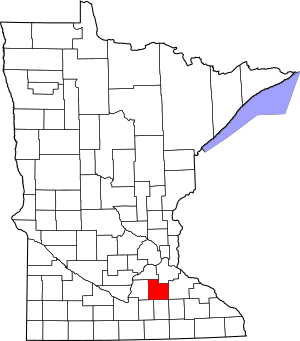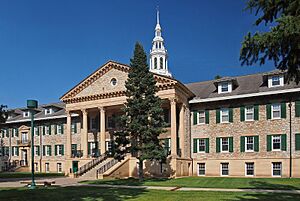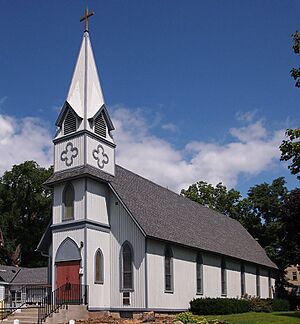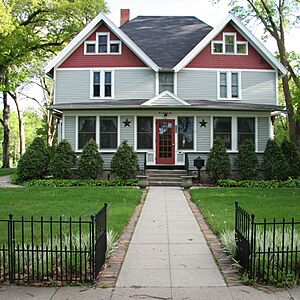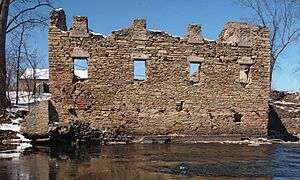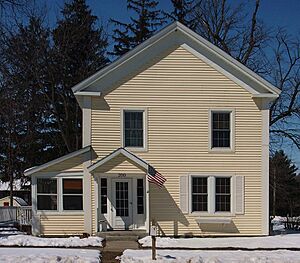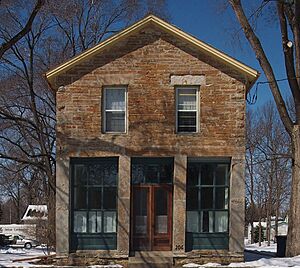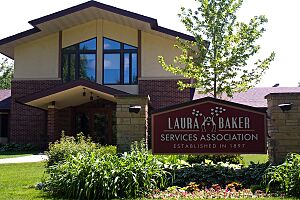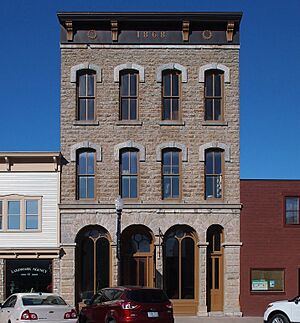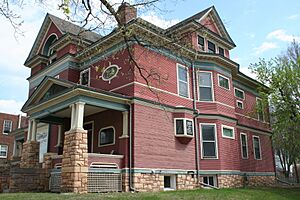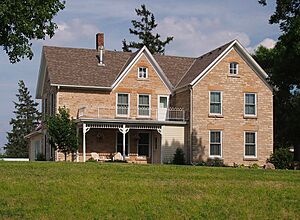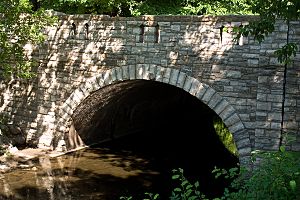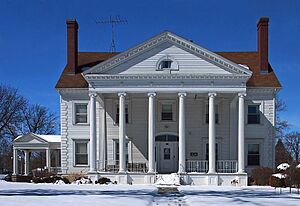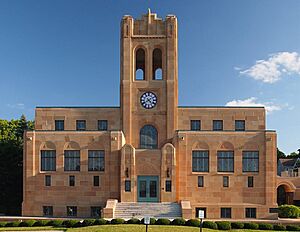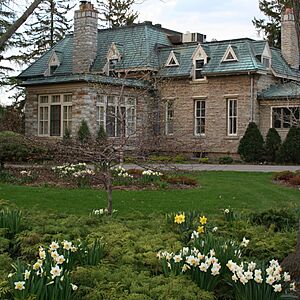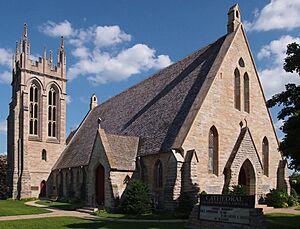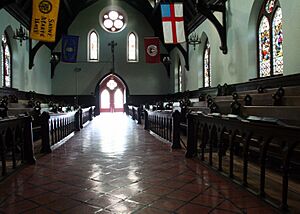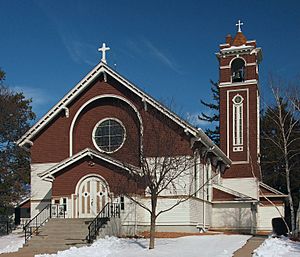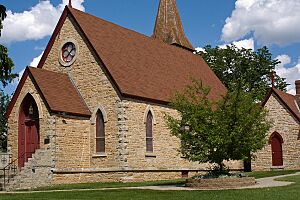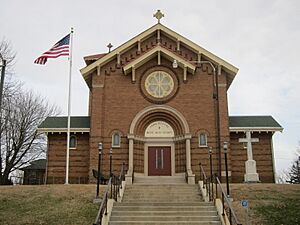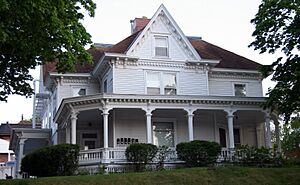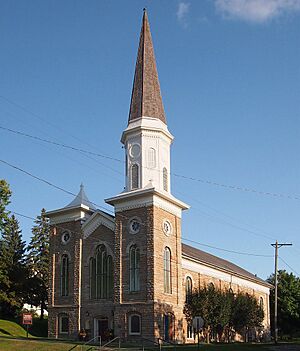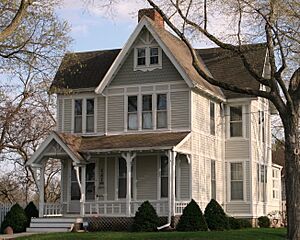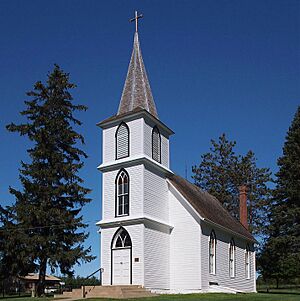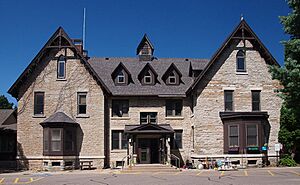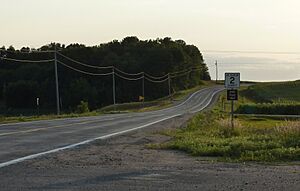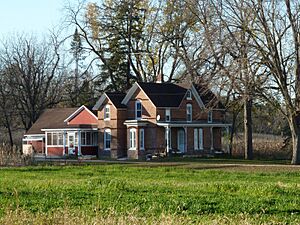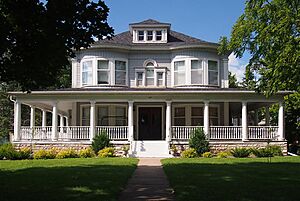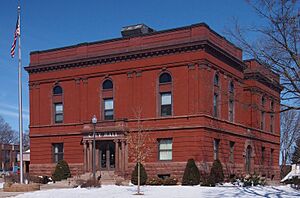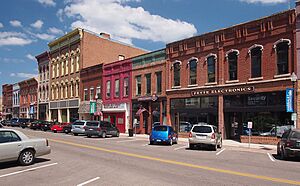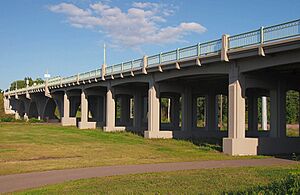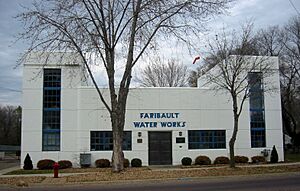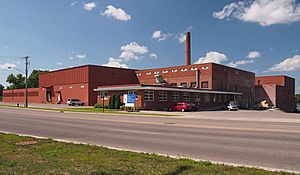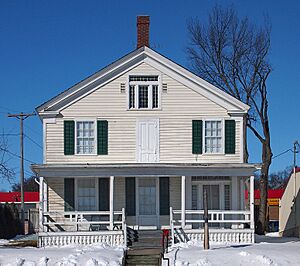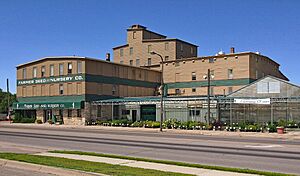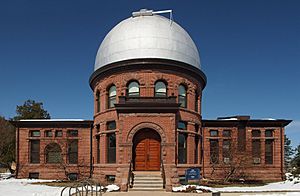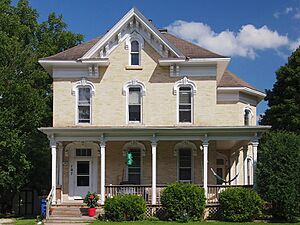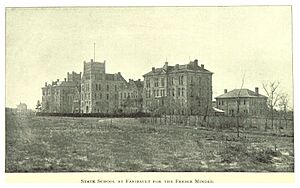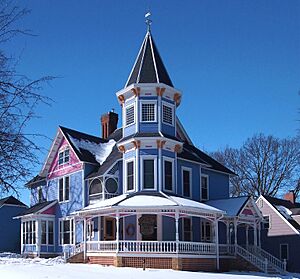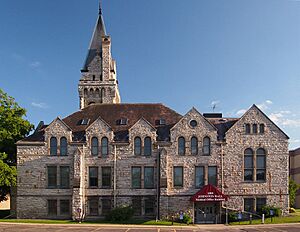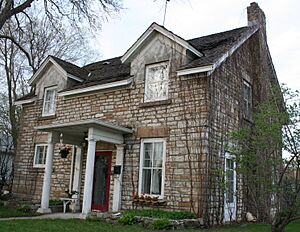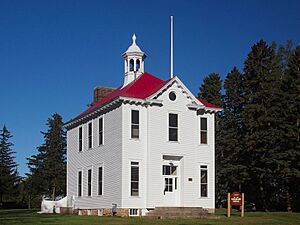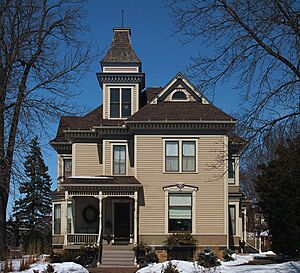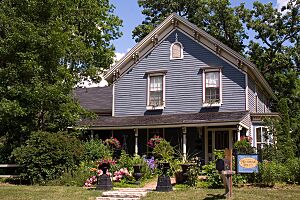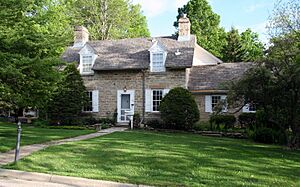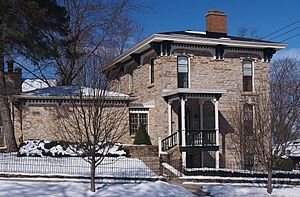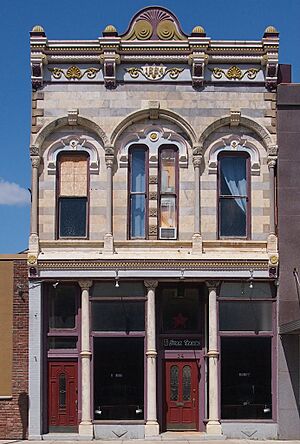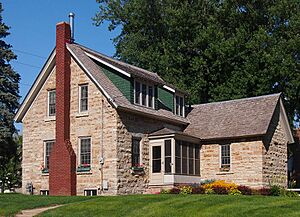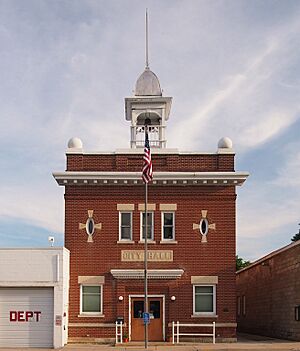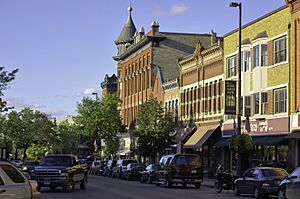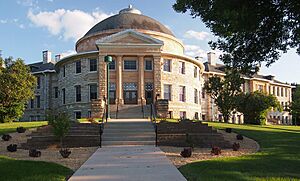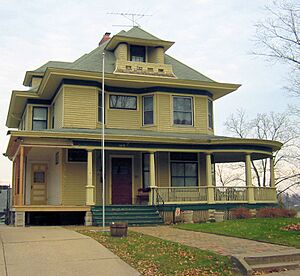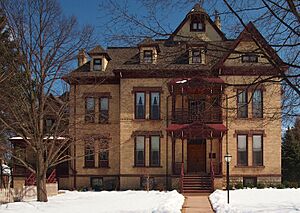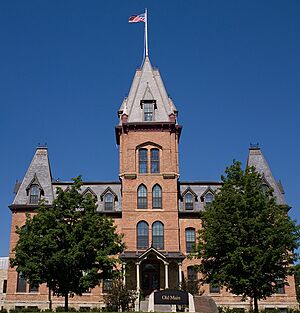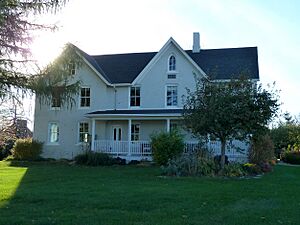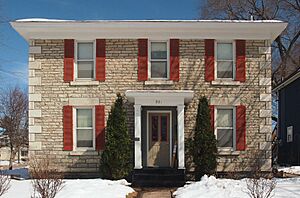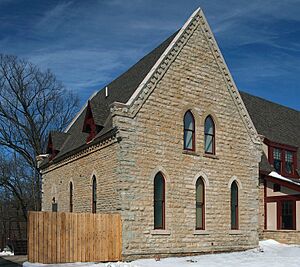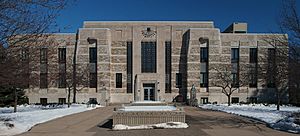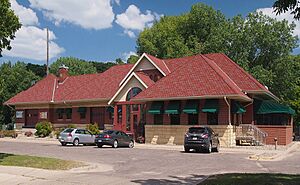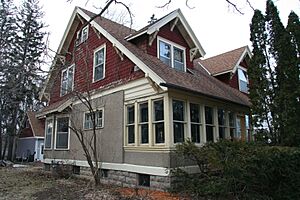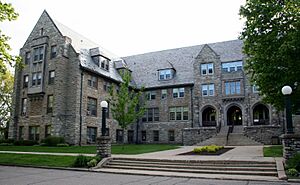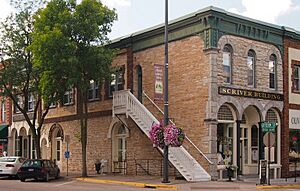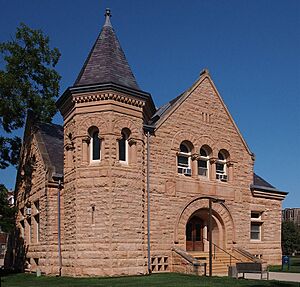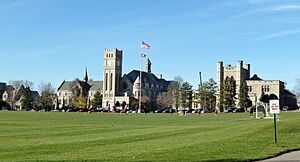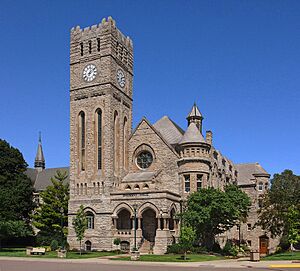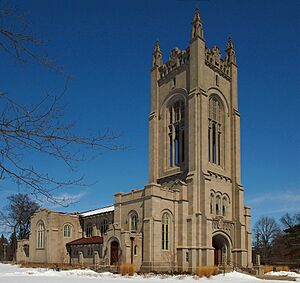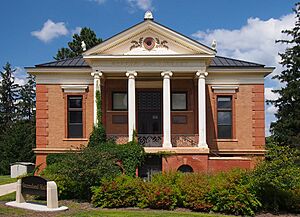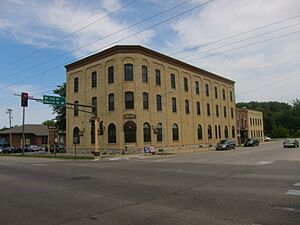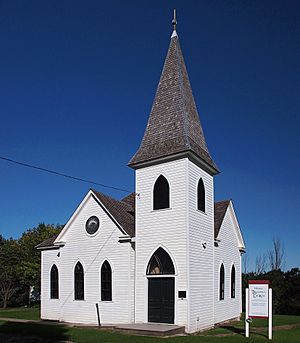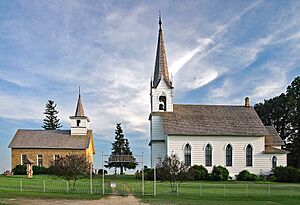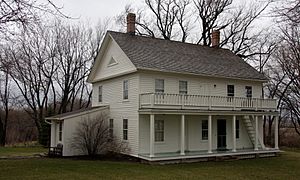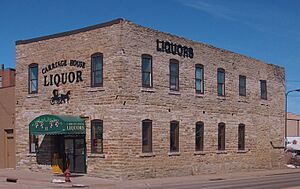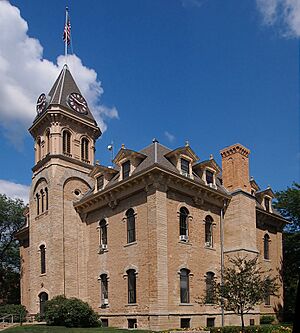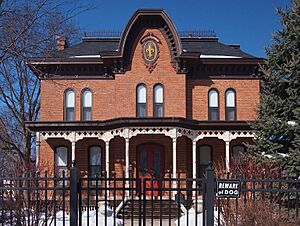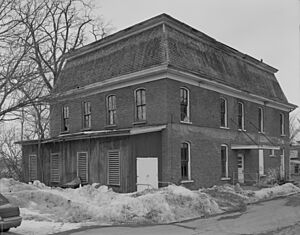National Register of Historic Places listings in Rice County, Minnesota facts for kids
Have you ever wondered about the old buildings and special places in Rice County, Minnesota? This article is all about the cool historic spots listed on the National Register of Historic Places. This is a special list kept by the United States government to honor places that are important to our country's history.
There are 75 places and areas in Rice County on this list. Two of them are even more special and are called National Historic Landmarks. There were also three other places that used to be on the list but are not anymore. Let's explore some of these amazing historic sites!
Historic Places in Rice County
Here are some of the interesting places in Rice County that are listed on the National Register of Historic Places:
- Minnesota State Academy for the Deaf (Administration Building)
* This building, finished in 1912, was designed by a famous architect named Clarence H. Johnston, Sr.. It's a great example of the grand buildings made for Minnesota's state schools back then. * Location: Faribault
*
- All Saints Church-Episcopal
* Built in 1866, this church is a wonderful example of the Gothic Revival style. Many small churches like this were built using designs from a famous architect named Richard Upjohn. * Location: Northfield
*
- W. Roby Allen Oral Home School
* This school, built in 1923, was a boarding school for deaf students. It was started by Bessie Blaker Allen, a pioneer in deaf education. * Location: Faribault
*
- Archibald Mill
* These are the ruins of a flour mill from 1857 and 1870. The family who owned it was very advanced for their time. They helped create new ways to mill wheat and make flour. Their "Dundas Straight" flour was considered the best in the country! * Location: Dundas
*
- Edward T. Archibald House
* This house was lived in by one of the founders of the Archibald Mill between 1867 and 1885. * Location: Dundas
*
- Ault Store
* Built in 1866, this is the last old store building left from Dundas's first business area. It shows what early commercial buildings in Rice County looked like. * Location: Dundas
*
- Laura Baker School
* This boarding school was founded in 1898 by Laura Baker, a pioneer in special education for students with intellectual disabilities. The original 1880s building had beautiful Queen Anne architecture. (Note: All original buildings have been taken down.) * Location: Northfield
*
- Batchelder's Block
* This building, constructed in 1868, is the second-oldest commercial building in Faribault. It's also known for its amazing Italianate architecture. * Location: Faribault
*
- Frank A. and Elizabeth Berry House
* This house was built in 1896 and designed by Olof Hanson. It shows a mix of Queen Anne and Classical Revival styles. * Location: Faribault
*
- Bonde Farmhouse
* This farmhouse, built in 1875, belonged to an important Norwegian immigrant family. It's also special because it was built with local limestone and is still in great condition. * Location: Near Nerstrand
*
- Bridge No. 8096
* This bridge, rebuilt in 1947 from an older 1914 bridge, has an unusual Gothic Revival design with stone veneer. * Location: Northfield
*
- Cassius Buck House
* Built in 1895, this house is also called "Buckeye." It's important because it was home to a well-known local banker and politician, and it features Neoclassical architecture. * Location: Faribault
*
- Thomas Scott Buckham Memorial Library
* This library, built in 1930, is a great example of public buildings from that time. It was the home of the Faribault Public Library for many years and honors a notable local leader. * Location: Faribault
*
- Louis Carufel and E. LaRose House
* This 1877 house is made of local limestone and has a Gothic Revival style, which is rare in Faribault. It was later updated in 1883 with Italianate features. * Location: Faribault
*
- Cathedral of Our Merciful Saviour and Guild House
* This cathedral, built in 1862 and designed by James Renwick, Jr., was the main center for the Episcopal Church in Minnesota. It was led by Bishop Henry Benjamin Whipple. The Guild House was added in 1894. * Location: Faribault
*
- Chapel of the Good Shepherd
* This beautiful 1871 chapel, located at Shattuck School, is a great example of Gothic Revival architecture. It was designed by Henry Martyn Congdon for one of Bishop Henry Benjamin Whipple's first groups. It's the only building left from the original location of Whipple's Seabury Divinity School. * Location: Faribault
*
- Church of the Annunciation
* This church, built in 1913, has a unique American Craftsman design. * Location: Webster Township
*
- Church of the Holy Cross-Episcopal
* This 1868 church was supported by John S. Archibald, who promoted the mill town. It's also known for its Gothic Revival architecture based on Richard Upjohn's designs. * Location: Dundas
*
- Church of the Most Holy Trinity (Catholic)
* This 1905 church belonged to a Catholic Czech American community. * Location: Wheatland Township
*
- Gordon Cole and Kate D. Turner House
* This house, built around 1856, was made bigger and more decorative, becoming one of Faribault's most fancy Italianate homes. * Location: Faribault
*
- Congregational Church of Faribault
* This stone church from 1867 has a Romanesque Revival style. It was designed by Monroe Sheire for Rice County's oldest church group, started in 1856. * Location: Faribault
*
- John N. and Elizabeth Taylor Clinton Cottrell House
* This 1897 house is the only example of Stick style architecture still standing in Faribault. * Location: Faribault
*
- Christdala Evangelical Swedish Lutheran Church
* This 1878 church was built by Rice County's first Swedish farming community. It shows how important the Swedish Lutheran Church and Swedish immigration were in rural Minnesota. * Location: Near Lonsdale
*
- Reverend James Dobbin House
* This beautiful 1874 house is a great example of Gothic Revival architecture. It was built using limestone from local quarries. * Location: Faribault
*
- Dodd Road Discontiguous District
* This is a 6.8-mile long section of a road built in 1853. It was a very important transportation route in early south-central Minnesota. * Location: Near Lonsdale
*
- Edwin S. Drake Farmhouse
* This brick house, built around 1863, belonged to an important early settler. It's also a well-preserved example of farmhouses built by American-born settlers in the area. * Location: Bridgewater Township
*
- Episcopal Rectory
* This 1897 house is Faribault's most complete building designed by Olof Hanson. It features Colonial Revival architecture. * Location: Faribault
*
- Faribault City Hall
* This city hall, built between 1984 and 1997, shows the Renaissance Revival style. It's linked to Faribault becoming an important city in the region. * Location: Faribault
*
- Faribault Historic Commercial District
* This area is the main business district of Faribault, dating back to when the city was growing as a trade center. The 19 buildings, built between 1870 and 1898, are known for their Italianate and Queen Anne styles. * Location: Faribault
*
- Faribault Viaduct
* This concrete bridge, built in 1937, has cool Art Deco and Classical Revival decorations. It was one of the last big bridges of its kind built in Minnesota. It also helped connect parts of the city separated by a river and train tracks. * Location: Faribault
*
- Faribault Water Works
* This pumping station shows two different times of city water supply. One building is from 1883, and another from 1938 was built by the Works Progress Administration. * Location: Faribault
*
- Faribault Woolen Mill Company
* This is Minnesota's biggest and longest-running woolen mill, which started in 1892. * Location: Faribault
*
- Alexander Faribault House
* This house, built in 1853, belonged to the important fur trader Alexander Faribault. It was the first wooden house built in Rice County. Today, the Rice County Historical Society takes care of it. * Location: Faribault
*
- Farmer Seed and Nursery Company
* This seed warehouse grew many times between 1899 and the 1920s. It shows how important Faribault was as a center for distributing farm products. * Location: Faribault
*
- Goodsell Observatory--Carleton College
* This observatory, built in 1887, was the official timekeeping station for the region. It's also known for its old scientific equipment and its connection to astronomer William W. Payne. * Location: Northfield
*
- M. P. Holman House
* This brick house, built around 1875, is an example of Italianate architecture. * Location: Faribault
*
- Hospital, State School for the Feeble Minded
* This facility, built in 1900, was a resource for people with intellectual disabilities. A pioneering psychologist, A.R.T. Wiley, had his laboratory here. (Note: This building has likely been taken down.) * Location: Faribault
*
- John Hutchinson House
* This 1892 house, built in the Queen Anne style, belonged to a successful furniture factory owner. It is now a bed and breakfast. * Location: Faribault
*
- Johnston Hall-Seabury Divinity School
* This 1888 building, in the Romanesque Revival style, was a library and faculty home. It's the best surviving building from the Seabury Divinity School, which trained many Episcopal leaders. * Location: Faribault
*
- Vincent and Elizabeth Lieb House
* This limestone house, built in 1862, is an example of vernacular style. * Location: Faribault
*
- Lonsdale Public School
* This 1908 public school is important for its role in local education. It mixes simple building styles with fancy decorations. * Location: Lonsdale
*
- Drew H. Lord House
* This 1887 house belonged to a very successful local builder. It's also known for its Eastlake Movement architecture. * Location: Northfield
*
- Wiliam Martin House
* This 1869 house dates back to when Dundas was a major milling center. It shows a mix of Greek Revival and Italianate styles. * Location: Dundas
*
- Cormack McCall House
* This house, built around 1871, belonged to an important local stonemason. It's an example of the simple stone homes built for working-class families in early Faribault. * Location: Faribault
*
- Thomas McCall House
* This is one of Faribault's best houses made of local limestone. It was built in 1868 by a famous local stonemason for himself. It was later updated in 1908 with Italianate architecture. * Location: Faribault
*
- Timothy J. McCarthy Building
* This fancy 1884 commercial building has Italianate architecture and is the only building in Faribault with a polished marble front. * Location: Faribault
*
- Thomas and Bridget Shanahan McMahon House
* This 1871 stone house is a well-preserved example of the simple homes built for working-class families in early Faribault. * Location: Faribault
*
- Nerstrand City Hall
* This 1908 city hall shows the early growth of Nerstrand. It's the best example of a city building from the early 20th century in Rice County. * Location: Nerstrand
*
- Northfield Commercial Historic District
* This four-block area is the town center of Northfield, dating back to 1856. It still looks much like it did historically, with different types of buildings along a scenic river. * Location: Northfield
*
- Noyes Hall, State School for the Deaf
* This grand building, built between 1902 and 1910, has a Neoclassical rotunda. It shows how much importance Minnesota placed on state-run special education schools. * Location: Faribault
*
- Jonathon L. and Elizabeth H. Wadsworth Noyes House
* This 1896 house, designed by Olof Hanson, is one of the most complete examples of his residential work. It features Queen Anne and Shingle Style elements. * Location: Faribault
*
- John C. Nutting House
* Built in 1887–88, this is Northfield's only large, brick house from the late 1800s that is still standing. It is now the official home for the president of Carleton College. * Location: Northfield
*
- Old Main, Saint Olaf College
* This building, from 1877, is the main center of St. Olaf College. It symbolizes a school started by Norwegian Lutheran immigrants to provide education and keep their heritage alive. It also has Gothic Revival architecture. * Location: Northfield
*
- Osmund Osmundson House
* This 1880 house belonged to Osmund Osmundson, a Norwegian immigrant who founded the town of Nerstrand. * Location: Nerstrand
*
- John Gottlieb Pfeiffer House
* This 1868 house belonged to an important local stonemason. It's another example of the simple stone homes built for working-class families in Faribault. * Location: Faribault
*
- Phelps Library, Shattuck School
* This 1869 library, in the Gothic Revival style, is the oldest building still standing from an Episcopal boys' boarding school started by Bishop Henry Benjamin Whipple. * Location: Faribault
*
- Rice County Courthouse and Jail
* The courthouse, built in 1934, has an Art Deco style, and the brick jail is from 1910. Both replaced older buildings and show how the Rice County government buildings have changed over time. * Location: Faribault
*
- Rock Island Depot
* This 1902 train station helped complete Faribault's train network, making it an important trade center. It's the best-preserved train facility in Rice County's rail towns. * Location: Faribault
*
- O. E. Rolvaag House
* This was the home of the famous author Ole Edvart Rølvaag from 1912 until he passed away in 1931. He wrote books like Giants in the Earth, which showed the challenges of frontier life. * Location: Northfield
*
- Saint Mary's Hall
* This 1926 school building, designed by Clarence H. Johnston, Sr., is in the Gothic Revival style. It was built for an Episcopal girls' boarding school started in 1866. * Location: Faribault
*
- Scriver Block Building
* This commercial building, from around 1867, is famous as the site of the James-Younger Gang's failed bank robbery in 1876. This event led to their downfall. It's now a museum run by the Northfield Historical Society. * Location: Northfield
*
- Scoville Memorial Library
* Built in 1896, this was one of the first separate libraries for a small college in the Midwest. It's one of the few original buildings left at Carlton College and is known for its Richardsonian Romanesque architecture. * Location: Northfield
*
- Shattuck Historic District
* This area is the central campus of Faribault's well-known Episcopal schools. It has 20 important buildings built between 1869 and 1957 and is known for its Gothic Revival architecture. * Location: Faribault
*
- Shumway Hall and Morgan Refectory-Shattuck School
* These buildings, from 1887 and 1888, are part of a famous boys' boarding school. They are noted for their Romanesque and Gothic Revival architecture. * Location: Faribault
*
- Skinner Memorial Chapel
* This chapel, built in 1916, is important for its late Gothic Revival architecture and how it adds to the look of the Carlton College campus. * Location: Northfield
*
- Steensland Library-Saint Olaf College
* Built in 1902, this is a rare building still standing from the early days of St. Olaf College. It's also a good example of Neoclassical architecture and early college libraries. * Location: Northfield
*
- Theopold Mercantile Co. Wholesale Grocery Building
* This 1893 wholesale warehouse shows how important Faribault was as a center for distributing goods in the region. * Location: Faribault
*
- Trondhjem Norwegian Lutheran Church
* This 1899 church and its cemetery are a prominent symbol on a hilltop for the surrounding Norwegian American pioneer community. * Location: Near Lonsdale
*
- Valley Grove
* This site has two churches next to each other: a stone church from 1862 and a wooden Gothic Revival church from 1894. They show two different times of rural Norwegian American life in a beautiful hilltop setting. * Location: Near Nerstrand
*
- Thorstein Veblen Farmstead
* This farm, from around 1875, was the family home of the influential social thinker Thorstein Veblen (1857–1929). * Location: Northeast of Nerstrand
*
- Adam Weyer Wagon Shop
* This 1874 wagon and blacksmith shop is the most complete of Faribault's early stone industrial buildings. * Location: Faribault
*
- Willis Hall
* This is the original building of Carlton College, built between 1868 and 1872. It's also known for its Second Empire architecture. * Location: Northfield
*
- Hudson Wilson House
* This 1876 house, in the Second Empire style, belonged to an important community leader in early Faribault. * Location: Faribault
*
Former Listings
Some places were once on the National Register of Historic Places but are not anymore:
- Blind Department Building and Dow Hall, State School for the Blind
* These buildings, from 1874 and 1883, were part of the State School for the Blind. Dow Hall was taken down, and a memorial marks its spot. * Location: Faribault
*
- Church of St. Patrick-Catholic
* This 1888 church belonged to Minnesota's first Irish immigrant community. It sadly burned down in 2002. * Location: Near Faribault
- Dump Road Bridge
* This bridge showed a common style of truss bridges and was built by a notable Minnesota bridge contractor, A.Y. Bayne. It was taken down in 2001. * Location: Near Faribault
 | William M. Jackson |
 | Juan E. Gilbert |
 | Neil deGrasse Tyson |


